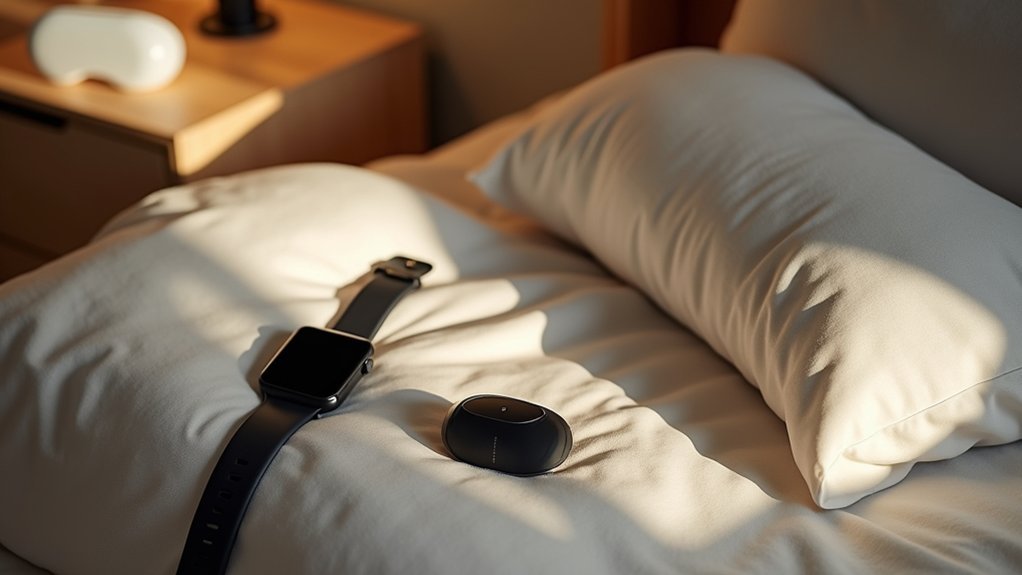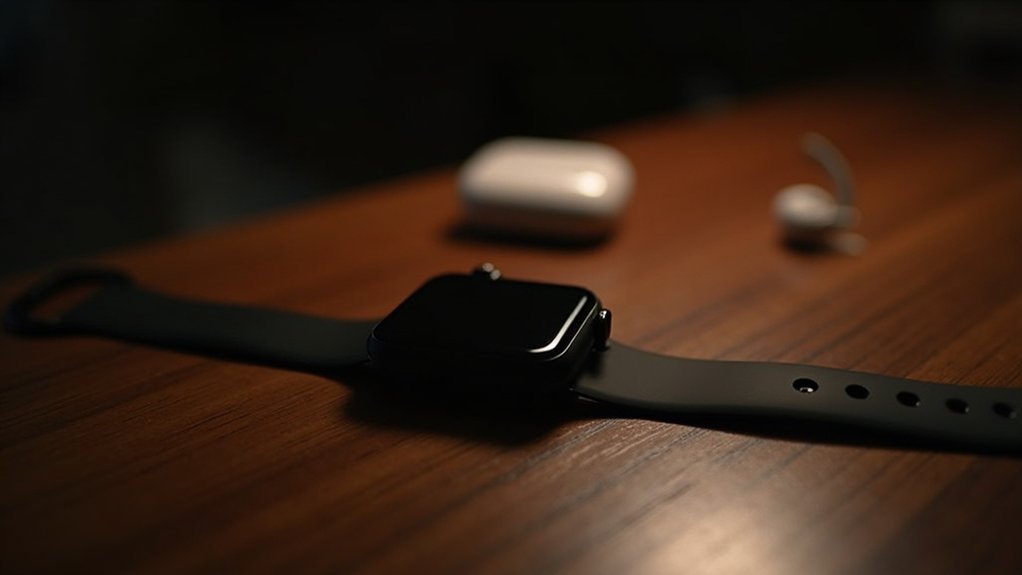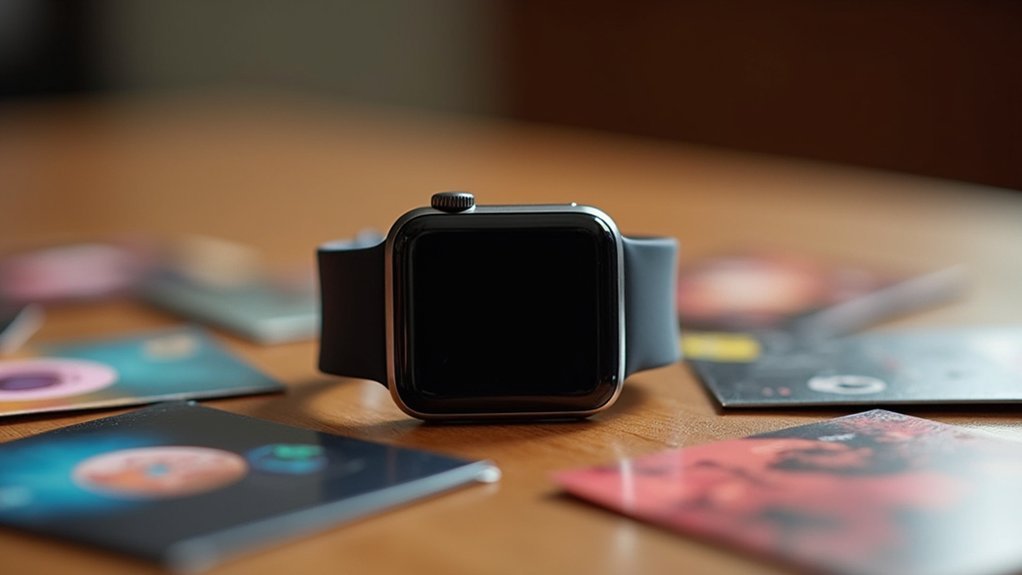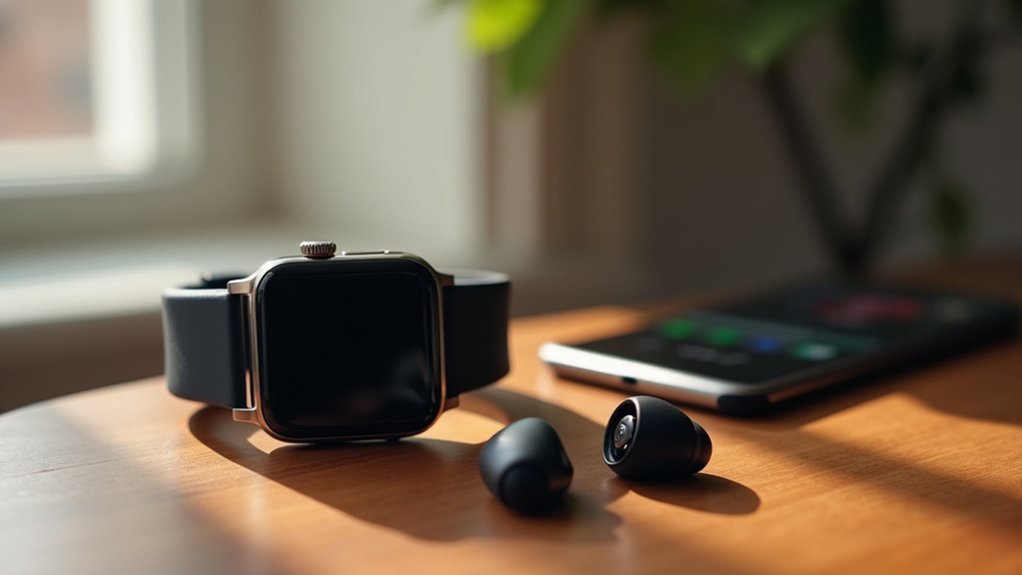You’ll find excellent sleep tracking options with these seven wearable devices. The Oura Ring 4 offers medical-grade accuracy with 18-path PPG sensors, while Whoop 4.0 provides personalized coaching and haptic alarms. For precision monitoring, Muse S uses EEG sensors with clinical validation. Samsung Galaxy Ring delivers minimalist design with thorough analysis, and Ultrahuman Ring Air combines advanced biometrics with extended battery life. Apple Watch Series 10 integrates seamlessly with health profiles, while Kokoon Nightbuds offer active noise cancellation. Each device brings unique features to enhance your sleep optimization journey.
Oura Ring 4: Advanced Sleep Staging With Discreet Design
The Oura Ring 4 transforms sleep tracking through its 18-path multi-wavelength PPG system, delivering medical-grade accuracy in a titanium ring that’s barely noticeable on your finger.
You’ll get thorough sleep stage breakdowns—light, deep, and REM—thanks to proprietary algorithms processing data from red, green, and infrared LEDs throughout the night.
The ring tracks over 30 biometrics including SpO2, heart rate variability, respiration rate, and skin temperature variations.
Its recessed sensors prevent irritation while maintaining comfort during continuous wear. You’ll receive personalized sleep readiness scores based on your unique physiology, helping you understand recovery patterns and optimize rest quality.
With shock-resistant titanium construction and multiple finish options, it withstands daily activities while syncing seamlessly to your mobile app for detailed sleep insights. The device provides up to 8 days of continuous monitoring between charges, ensuring uninterrupted sleep data collection.
Whoop 4.0 Band: Actionable Sleep Insights and Personalized Coaching
While Oura’s ring offers discreet monitoring, Whoop 4.0 takes a different approach by prioritizing actionable coaching over subtle design.
You’ll get personalized sleep recommendations through its Sleep Coach feature, which analyzes your four sleep stages—slow wave, REM, light sleep, and awake periods—with near-perfect accuracy.
The band’s five LEDs and four photodiodes deliver precise heart rate variability measurements averaged across your entire night, not just single points.
You’ll receive haptic alarms that wake you at ideal times within your sleep cycle, plus goal-based alerts tailored to your needs. The device calculates your individual sleep needs based on your personal patterns and daily strain levels.
Despite having no screen, Whoop 4.0’s 33% smaller design guarantees comfortable 24/7 wear with its Superknit band, while five-day battery life maintains seamless tracking without frequent charging interruptions.
Muse S Headband: EEG-Based Precision Sleep Monitoring
You’ll find that the Muse S Headband takes sleep tracking to the next level by using EEG sensors that directly measure your brain activity, rather than relying on indirect metrics like movement or heart rate alone.
This EEG technology gives you unprecedented precision in tracking your sleep stages—light, deep, and REM sleep—by monitoring the actual delta waves and neural patterns that define each phase.
The result is sleep data that’s far more accurate than traditional wearables, helping you understand exactly what’s happening in your brain throughout the night. The device also tracks movements to identify optimal sleep positions and offers Digital Sleeping Pills for enhanced sleep onset.
EEG Technology Advantages
Precision distinguishes the Muse S headband from standard sleep trackers through its advanced EEG sensor array that captures actual brainwave activity rather than relying on movement-based estimates.
You’ll benefit from four strategically positioned electrodes at TP9, AF7, AF8, and TP10 that monitor frontal and temporal brain regions with 256 Hz sampling rate and 14-bit resolution for enhanced signal fidelity.
The EEG technology provides several key advantages:
- Direct neural measurement captures real-time brainwave patterns instead of inferring sleep stages from movement
- Enhanced resolution with 14-bit depth delivers finer detail compared to 12-bit systems
- Multi-region monitoring from frontal and temporal areas provides thorough sleep stage classification
- Reduced artifacts through CMS/DRL reference electrode placement and silver thread fabric electrodes
You’ll get clinical-grade accuracy that differentiates between REM, deep, and light sleep phases. This comprehensive tracking enables users to identify areas for sleep improvement by analyzing their personal sleep data patterns.
Sleep Data Accuracy
Clinical validation demonstrates the Muse S headband’s exceptional accuracy in real-world sleep monitoring scenarios.
When compared to polysomnography—the gold standard for sleep studies—you’ll find the Muse S achieves impressive accuracy rates ranging from 88% to 96%. This positions it competitively alongside other advanced devices like the Dreem 2, where both perform at approximately 80% accuracy against professional equipment.
You can rely on the device’s consistent detection of various sleep stages, providing detailed insights into your sleep quality and patterns. The device records Delta, Theta, Alpha, Beta, and Gamma brainwaves to provide comprehensive mental state insights during sleep.
The thorough data collection enables you to understand your sleep architecture better than basic fitness trackers. Based on your collected data, you’ll receive personalized suggestions for improving sleep quality, making the Muse S a valuable tool for optimizing your rest.
Samsung Galaxy Ring: Smart Features Combined With Sleep Analysis
While most fitness trackers burden you with bulky designs that disrupt your sleep, Samsung’s Galaxy Ring takes a minimalist approach that delivers thorough sleep analysis without the bulk.
You’ll get extensive tracking of light, deep, and REM sleep stages alongside essential physiological metrics like heart rate, SpO2, and skin temperature. The ring calculates a sleep score out of 100, giving you clear insights into your nightly rest quality.
Key features that enhance your sleep tracking experience:
- Energy Score combines sleep, activity, and heart rate data for overall vitality assessment
- Snoring detection through smartphone microphone integration when placed nearby
- Seamless wireless syncing with Samsung Health and Galaxy Wearable apps
- Lightweight, comfortable design for uninterrupted overnight wear
You’ll appreciate the ring’s intuitive data visualizations and personalized insights that help optimize your sleep patterns. The device operates on a seven-day charge, eliminating frequent charging interruptions that could disrupt your sleep tracking routine.
Ultrahuman Ring Air: Advanced Biometrics With Extended Battery Life
You’ll find the Ultrahuman Ring Air stands out with its thorough biometric monitoring that goes beyond basic sleep tracking to include continuous heart rate, blood oxygen, and skin temperature measurements.
The ring’s 4-6 day battery life means you won’t need to interrupt your sleep tracking routine with frequent charging sessions like you’d with smartwatches.
Its advanced sensor array captures detailed physiological data throughout the night, giving you deeper insights into your sleep quality and recovery patterns. The device weighs only 2.4 grams, making it 11x lighter than typical smartwatches for comfortable all-night wear.
Advanced Biometric Features
Beyond basic step counting and heart rate monitoring, the Ultrahuman Ring Air delivers extensive biometric tracking through its sophisticated sensor array.
You’ll benefit from infrared photoplethysmography (PPG) sensors that continuously monitor your heart rate and oxygen saturation levels. The device’s non-contact medical-grade skin temperature sensors track changes in your body temperature, providing valuable insights into your health patterns.
The ring’s thorough monitoring system includes:
- 6-axis motion sensors that analyze your movement and activity levels throughout the day
- Multi-LED technology featuring red, green, and infrared LEDs for precise heart rate and oxygen monitoring
- Sleep pattern analysis that tracks your rest cycles and recovery phases
- Temperature-based wellness tracking that identifies health trends through skin temperature data
This advanced sensor combination enables accurate sleep analysis and recovery tracking for ideal wellness management. The device weighs only 2.4 grams, making it 11x lighter than typical smartwatches for comfortable all-day wear.
Extended Battery Performance
The Ultrahuman Ring Air’s 24 mAh lithium-ion battery delivers 4-6 days of continuous tracking on a single charge, setting it apart from competitors that require daily charging.
You’ll find minimal interruptions to your sleep data collection thanks to this extended runtime.
The ring’s Chill Mode, now the default setting, can extend battery life up to 35% longer by prioritizing sleep and rest tracking while limiting daytime biometric monitoring.
If you need full continuous tracking, you can switch to Turbo Mode through the app’s “My Ring” menu.
With approximately 500 charging cycles before noticeable degradation and 90-180 minute charging times, you’ll experience reliable long-term performance. To maximize battery longevity, avoid full discharge and recharge when the battery level reaches around 30%.
The waterproof titanium construction protects the battery from moisture damage during sleep.
Apple Watch Series 10: Integrated Health and Sleep Tracking
While many fitness trackers offer basic sleep monitoring, Apple’s Watch Series 10 delivers an extensive sleep tracking experience that seamlessly integrates with your broader health profile.
You’ll benefit from thorough sleep stage analysis tracking REM, Core, and Deep sleep phases through advanced heart rate and motion sensors.
The device’s lightweight design guarantees comfortable overnight wear while its fast-charging capability provides eight hours of tracking with just an eight-minute charge. The Series 10 offers two size options with the 42mm model weighing just 30 grams for aluminum GPS versions, ensuring minimal sleep disruption.
You can set multiple sleep schedules and receive sleep apnea notifications for potential breathing irregularities.
Key integrated health features include:
- Sleep Focus mode that automatically minimizes distractions during scheduled sleep times
- 14-day sleep trend analysis providing detailed pattern insights
- Morning summaries combining sleep duration with battery status recommendations
- Seamless data integration with heart rate monitoring and mindfulness metrics for thorough wellness tracking
Kokoon Nightbuds: Active Noise Cancellation for Enhanced Sleep Quality

If you’re seeking a sleep tracking solution that prioritizes audio comfort over thorough health metrics, Kokoon Nightbuds offer a unique approach through their ultra-slim 5.4mm profile and specialized noise masking technology. Unlike traditional earbuds, these feature a coiled neckband design that won’t interfere with side sleeping. You’ll get basic sleep stage tracking through optical heart rate monitoring and motion detection, plus smart audio features that automatically fade out content when sleep’s detected.
| Feature | Specification | Sleep Benefit |
|---|---|---|
| Profile Thickness | 5.4mm | Side-sleeping comfort |
| Battery Life | 10 hours | All-night tracking |
| Noise Management | Passive masking | Sound disturbance reduction |
| Sleep Detection | Automatic | Seamless audio shift |
The MyKokoon app provides soundscapes and guided meditations, though you’ll need third-party apps for thorough health analytics. At 22.4 grams total weight, the entire setup remains lightweight enough to maintain comfort throughout the night while delivering balanced armature audio quality optimized for relaxation content.
Frequently Asked Questions
Can Sleep Trackers Work Accurately for People With Sleep Disorders Like Sleep Apnea?
Sleep trackers can detect sleep apnea with moderate accuracy—up to 87% in studies—but they’re less reliable for severe disorders. You shouldn’t rely on them for diagnosis; they’re useful for initial screening only.
How Do Wearable Sleep Trackers Perform During Pregnancy or Hormonal Changes?
During pregnancy, you’ll find sleep trackers show declining accuracy as hormonal changes affect your sleep patterns. While devices detect overall disruptions well, they’re less precise at identifying specific sleep stages due to pregnancy’s physiological impacts.
Are Sleep Tracking Devices Safe for Children and Teenagers to Use Nightly?
You can safely use sleep tracking devices nightly for children and teenagers, but you’ll want to prioritize family comfort, avoid excessive monitoring, and remove other digital devices from bedrooms first.
Do Sleep Trackers Interfere With Pacemakers or Other Medical Implants?
Sleep trackers can interfere with your pacemaker or medical implants through electromagnetic interference. You should consult your doctor before using any wearable device and avoid placing trackers near your implanted device.
Can Multiple Sleep Trackers Be Worn Simultaneously for Better Accuracy?
You can wear multiple sleep trackers simultaneously to potentially improve accuracy by cross-validating data from different sensors, though comfort issues and device interference may affect your compliance and results.
In Summary
You’ve got seven excellent options to transform your sleep tracking game. Whether you’re drawn to the Oura Ring 4’s discreet monitoring or the Muse S’s EEG precision, there’s a device that’ll match your sleep goals and lifestyle. Don’t let another restless night go unanalyzed. Choose the wearable that resonates with your needs, and you’ll reveal insights that’ll revolutionize how you approach rest and recovery.





Leave a Reply